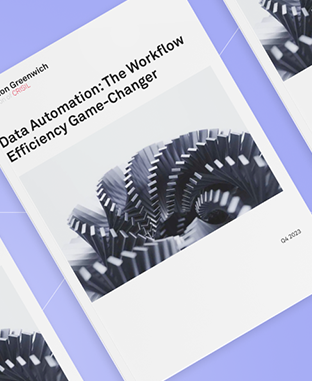Insights and resources
Read our expert insights and resources to learn more about automating asset management processes, data management and how we’re supporting financial services transformation.
White paper > T+1
Data automation: the workflow efficiency game-changer
New Coalition Greenwich report highlights the urgent need for tech and automation in capital markets.
White paper > Center of Excellence
Setting up a Center of Excellence
Read the whitepaper to unlock your potential with an Xceptor Center of Excellence.
Success stories > Confirmations
Automating the trade confirmation process
Discover how a global bank's successful, rapid automation of its trade confirmations process led to further rollout to another division.
Beyond automation
Xceptor and AI's impact on Account Onboarding, Confirmation Matching and Tax Management
Key takeaways from InvestOps 2024
Operational efficiencies are the top strategic priority for firms in 2024 - read our key takeaways from InvestOps 2024.
Generative AI in financial services: an opportunity for operations
Generative AI and document intelligence offer immense potential for financial services companies – most notably for operations teams.
Revolutionizing energy markets: the power of automation
Energy market participants must accelerate their use of automation and technology to meet the challenges of a growing, more complex trading environmen...
T+1 in the UK: ignore the clock
Now we know - T+1 is happening. What’s less clear, and where debate is raging, is whether the UK should align more closely with the US and implement ...
4 universal data challenges for Capital Markets (and how data automation can help)
Our cars can park themselves when we arrive at the office and ChatGPT can write emails for us - but many financial firms still receive faxes daily.
Interconnected markets: the imperative for data automation in 2024
Financial markets are interconnected, complex and filled with risk. Can data automation help them achieve end-to-end processing and interoperability ...
Data automation in 2024: 6 stats to know
As 2024 approaches, we wanted to understand the state of data automation in middle and back offices. Here are some interesting statistics we uncovered...
Navigating regulatory change and market dynamics in 2024 - the power of technology and AI
As 2023 draws to a close, we look towards a new year that will continue the transformation of financial services, driven by technological innovation a...
Xceptor wins best client onboarding solution at Data Management Insight Awards Europe 2023
According to McKinsey, onboarding is a great opportunity for financial institutions to differentiate themselves, win corporate customers, increase eff...
Clarity needed on FASTER initiative
EU moves to simplify withholding tax must address the practical realities of dealing with 27 different authorities
Unleashing the power of automation: redefining Capital Markets with data
Without data automation, Capital Markets firms will continue to deal with slow, inefficient processes and the never-ending remediation of errors due t...
Reflections on Sibos 2023
As the dust settles on Sibos 2023, I look back at the deliberations including the prospect of a frictionless T+1 settlement ecosystem, the role of AI ...
Gathering for collaborative finance in Toronto at Sibos 2023
Funds Europe has sought insights from some of the speakers at Sibos 2023 including our very own John Bevil.
A strategic approach to tactical reconciliations
There will be times when business users require a tactical, efficient, and convenient reconciliation tool to solve a business need. EUCs respond quick...
The journey to T+1 settlement
John Bevil shares his thoughts on how technology can help businesses achieve their T+1 targets with A-Team Insight.
Time is of the essence for fund administrators as T+1 is rolled out around the world
We teamed up with Firstsource to launch a solution tailored specifically for fund admins who are facing the realities of T+1.
Problems remain around T+1 implementation
There are "no easy fixes" for many issues around T+1, according to speakers at Xceptor's 20th anniversary celebration event.
Removing the pain from tax reclaim
The automated capture, production and management of tax reclaims have transformed the tax reclaim process from income payment to credit of reclaims.
Prioritizing tax relief at source
Why you should prioritize providing a withholding tax relief at source service to your customers.
Automating tax document management
In the first of our tax operations transformation series, we focus on automating tax documentation management to maximize tax relief at source.
Solving the challenge of bringing automation into financial services
Replacing legacy tech with new automated systems is no easy feat as various challenges arise.
Pitfalls of EUC reconciliation
EUCs are essential to your operations. But they represent risk. Learn how to identify and manage EUC risks across your business.
How to automate your 'tactical' reconciliations
Efficient and accurate reconciliations are critical for ensuring data consistency.
Are you in the T+1 slipstream?
Clients are reporting that T+1 is front and centre of their Spring workload and, for many, 2023 is the year of implementation and refinement.
The future of withholding tax
We look at what the future might look like for Withholding Tax reclaims and how firms can flex to meet the demands of a modern WHT landscape.
Taking control of your reconciliations: data, aggregation, validation and enrichment
For any reconciliation to operate effectively it must be provided with readable and complete data.
Taking control of your Reconciliations: achieving greater efficiency
Reconciliation is essential to client satisfaction and data consistency, where multiple copies of the same trade data are maintained across firms.
T+1 gets closer every day. Are you ready?
We look at how firms can proactively ready themselves for the next transformational leap in processing and settlement cycles.
Navigating the intricate world of withholding tax
In the first instalment of our two-part on the world of withholding tax (WHT), we look at some of the key issues for WHT reclaims.
How T+1 will impact the confirmations process
For T+1 to make successful in-roads into a more robust and efficient post trade infrastructure, clear examination and a review of the confirmation pro...
T+1: Swifter transaction management
Our latest T+1 blog addresses the need to automate transaction management to meet intra-day trade settlement.
Accelerated account opening in a T+1 world
A major impact to capital markets infrastructures by moving to T+1 is the reduced time for remediating sub-optimal account onboarding and account and ...
Is T+1 playing on your mind?
A global move towards T+1 settlements will likely create added benefits, if not examined at a strategic macro level, there could also be complications...
Predictions 2023: A year of evolution and adaptation
The competent extraction and transformation of data while offering end-to-end automation of complex processes will be imperative in 2023.
Change on the horizon for EU Withholding Taxes
For too long, a fragmented European Withholding Tax landscape has stifled cross-border investments while resource-intensive reclaim procedures have le...
Celebrating women's achievements
This International Women’s Day we’re proud to join voices across the world in celebrating women’s achievements.
Interpreting data for the regulators in 2021
Could there be good news in the offing? In our latest podcast, PJ says the quest for digital standards that simplify complex regulatory reporting is o...
Our tax clients and tax community are our best sources of intel
For more than a decade, Xceptor has been fortunate to sit at the heart of an engaged and active tax community.
Reconciliations: Build the business case for change
Only a shift in mindset will bring about transformational change in reconciliations. Now is the time to make a difference to how the function operates...
Is reconciliation the problem or is it data control?
Capco's Jibs Ahmed threw down the gauntlet to Capital Markets firms – do data properly so that reconciliations don’t exist.
Bridging the gap
Dan Reid, CTO of Xceptor, shares his insight on the common ground between data engineers and business analysts
Put your data first
Andrew Kouloumbrides, shares why trusted data is essential to making better decisions. Data-driven and customer-centric decision support should be the...
2020 predictions on regulation
It’s time for Regulatory 2.0 – major regulators and international bodies are starting to step back and review their regulations, asking – why did we d...
Opinion: Capital Markets and the Road to Intelligent Automation
Opinion piece by Xceptor CEO, Andrew Kouloumbrides: Many firms are underutilizing the full potential of automation technology. How can firms overcome ...
Using machine learning to augment automation
Push aside the AI hype and identify practical applications that deliver tangible returns. That's the mission for augment automation.
Driving digital transformation success through data
The main drivers for digital transformation programmes should be differentiation and customer value. With this approach, greater cost reduction is ac...
5 ways to get ahead with buy side account opening
Now is the time to focus on the looming buy side account opening deluge. 2020 initial margin rules will make an already overburdened account opening f...
What is the real impact of data exceptions on regulatory reporting?
A recent Adox Research survey shows powerful stakeholders in compliance and other front-line functions, are targeting data exceptions as the missing l...



























.png)
.png)
.png)



















